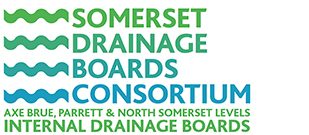Under the Land Drainage Act 1991, Drainage Boards have a duty to exercise general supervision over all matters relating to the drainage of land within its district, and to hold various permissive legal powers to undertake the operation, maintenance and improvement of any watercourse in its area.
(Main Rivers are excluded from this power). To assist a Drainage Board in undertaking these roles, Section 66 of the Land Drainage Act 1991 allows a Board to create Byelaws that control all activities within 9 metres of all watercourses.
Somerset Drainage Board Consortium’s Byelaws are available here.
Under Section 23 of the Land Drainage Act 1991 and the Drainage Byelaws created under Section 66, any work that could alter the flow of any watercourse, cause an obstruction to the flow of the watercourse, occur within 9 metres of watercourse, over or under a watercourse, or introduces flow into the IDB area must first obtain the consent of the Internal Drainage Board prior to starting works on site.(see box below for list of works that need consent). The Board must receive details of any proposed works affecting watercourse, and grant permission for the work to proceed. The board might request modifications to the proposed works during the review process for environmental, flood risk or maintenance reasons. Where the watercourse is a Main River, consent from the Environment Agency is required, rather than the Board.
In the Land Drainage act 1991, a watercourse is defined as “all rivers and streams and all ditches, drains, cuts, culverts, dikes, sluices, sewers (other than public sewers within the meaning of the Water Industry Act 1991) and passages through which water flows”.
Consents are required for both temporary and permanent works in or adjacent to any watercourse (except a main river) within the Board’s district. This includes any of the below:
Works within the watercourse:
Mill, dam, weir, sluice gate, culvert or other obstruction to the flow, infilling or stopping up of a watercourse, jetty, wharf, pier, quay
Works above or under or affecting the bank and bed or/and bed of a watercourse or affecting the bank :
pipe or wire crossing a watercourse, any excavation of a watercourse bank or bed, any outfalls,bridge, piling, groyne.
Works within 9 m of a watercourse:
building, structure, road, footpath, track, tree, shrub willow or similar growth, any, fence, post, pylon, loading stage, revetment, land raising.
Applications:
Please find the relevant application forms and guidance notes below:
1) Access Culvert application form only click here
a. If your application is only for the purposes of an access gateway culvert less than 8m then please use this application
b. Please read through the associated guidance document to aid with this application
c. The form should be downloaded, completed electronically and emailed to LDC@somersetdbs.co.uk please avoid sending by post as it might result in delays to
your application.
d. The application will not be considered complete until all information is submitted.
Please use the guidance document.
2) General Land Drainage Consent Application Form click here
a. For all other works, please use this application form
b. Please read through the associated guidance document to aid with this application
Guidance:
Guidance document for access culverts no greater than 8m linked here
Guidance document for general LDC form linked here
Typical headwall options sheet linked here
Typical construction sequence sheet linked here
Application Submission:
The application form and the accompanying documents should preferably be sent electronically to LDC@somersetdbs.co.uk
Alternatively, the application form and accompanying documents can be sent through post to:
Somerset Drainage Boards Consortium
Bradbury House
33-34 Market Street
Highbridge
Somerset
TA9 3BW
Payment Methods:
On receipt of the application, the Board will determine how many items, within the application, requiring a consent, and will issue an invoice accordingly.
Applicants are reminded that payment should not be sent until the Board has confirmed that the full suite of the information required has been submitted, and confirmed the applicable charge.
Consultation Period:
Once the Board is satisfied the full suite of information has been received and payment has been processed, a 60 day consultation period begins. The process will be delayed if the applicant does not supply all requested information therefore it is strongly recommended the applicant reads the guidance documents to ensure submission of a complete application. An extension of 60 days may be agreed with the applicant in some circumstances.
The granting of a Land Drainage Consent may be subject to conditions such as the time and manner
in which the work may be carried out.
Failure to Obtain Land Drainage Consent:
The failure to obtain a Land Drainage Consent prior to carrying out the works may be a criminal offense. Any person acting in contravention of any of the Board’s Byelaws, or Section 23 of the Land Drainage Act 1991, may be liable, on conviction, to a fine of up to £5,000, and to a further fine of up to £40 for every day on which the contravention is continued after conviction.
Under Section 24 or 66 of the Land Drainage Act 1991 the Board has the power (without prejudice to any other criminal proceedings) to take such action as may be necessary to remedy the effect of the contravention or failure to obtain consent, and to recover the expenses reasonably incurred by it in so doing from the person in default.
Other Permissions:
The issue of a Land Drainage Consent by the Board does not absolve a person proposing to execute works from the need to obtain any other licenses, consents or permissions which may be required by law. The Board issue Land Drainage Consents under the Drainage Board Byelaws and the Land Drainage Act 1991. It is the applicant’s responsibility to ensure that any other necessary permission from other authorities or undertakers is obtained.
Right of Appeal:
If you believe that a Land Drainage Consent had been unreasonably withheld, or that the conditions that have been imposed are unreasonable, you have a right of appeal to an independent arbitrator

